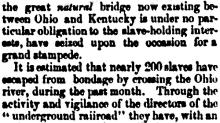Ohio News.
The following letter to the Boston Transcript, will interest every reader:
CINCINNATI, Feb. 5th, 1856.
Dear Transcript:––Ere this date the telegraph has conveyed to you some account of the recent slave tragedy in this city. The excitement consequent upon this terrible affair still continues, and the sympathy of our citizens had been deeply excited in behalf of the family of fugitive slaves now under arrest. The intensely cold weather which has prevailed in this region has frozen over the Ohio river to and extent before unknown, the ice averaging in thickness over fourteen inches, and while the citizens of Ohio and Kentucky are enjoying the facilities for pleasure in the way of skating, coasting, &c., where this immense extent of ice affords, the slaves in Kentucky who are fully aware that the laws of the State make it a penal offence for the toll man to allow them passage over any bridge within the limits of the State, and probably supposing that the propriety of the great natural bridge now existing between Ohio and Kentucky is under no particular obligation to the slave-holding interests, have seized upon the occasion for a grand stampede.
It is estimated that nearly 200 slaves have escaped from bondage by crossing the Ohio river, during the past month. Through the activity and vigilance of the directors of the "underground railroad" they have, with an unfortunate exception, all been "put through." One family, composed of five persons, husband, wife, wife's mother, and two small children, came safely over the river, but were immediately pursued by their master to the place of secretion. The family defended themselves by the use of firearms, but when resistance appeared hopeless, rather than allow her children to be carried back into the "–––of American slavery," the mother deliberately murdered one, and attempted the destruction the other, as the following testimony will show:
The following is the testimony of Mary Garner, mother-in-law of the murderess:
On yesterday about 12 1-2 o'clock, as near I can recollect, at a house near Milcreek bridge, Margaret Garner said to me––"Mother, before my children shall be taken back to Kentucky, I will kill every one of them." She ran to her child, a little girl about three years old, with a butcher knife, and cut its throat. She said––"Mother, help me to kill them." I said, "I can't help you to kill them;" and went out of the room and got under a bed in another room, and staid there until I was hauled out by some men. I did not see her do any thing to the other children; when this happened there was none of the colored people in the room but Margaret, myself and the children. A good many white men were rushing in; some of them were pulling my husband into the back room, and some were pulling Margaret's husband out of the front door. The child's throat was cut when the white men were rushing into the room.
What a significant commentary does this tragedy afford on the assertion so often made of the strong affecting of the slaves for their masters.
The case has become exceedingly complicated, and very great interest is felt, both in Kentucky and on this side of the river,as to the result. The general impression seems to be that Messrs. Marshal and Gaines have a very slim chance of ever getting any of the negroes back into slavery. When the murder trial, habeas corpus trial, United States Commissioner's trial, resistance to officers' trial, false imprisonment trial, affidavits from Oregon, and other matters, are gone through, there is such a general unwillingness to carry out the fugitive slave law, even if Messrs. M. and G. fully make out their case, the result will still be doubtful. Should the infants be sent back, and the mother be held to answer for the crime of the murder, it will cause tremendous excitement.
"Ohio News," Biddeford (ME) Union and Eastern Journal, February 22, 1856, p. 3.

